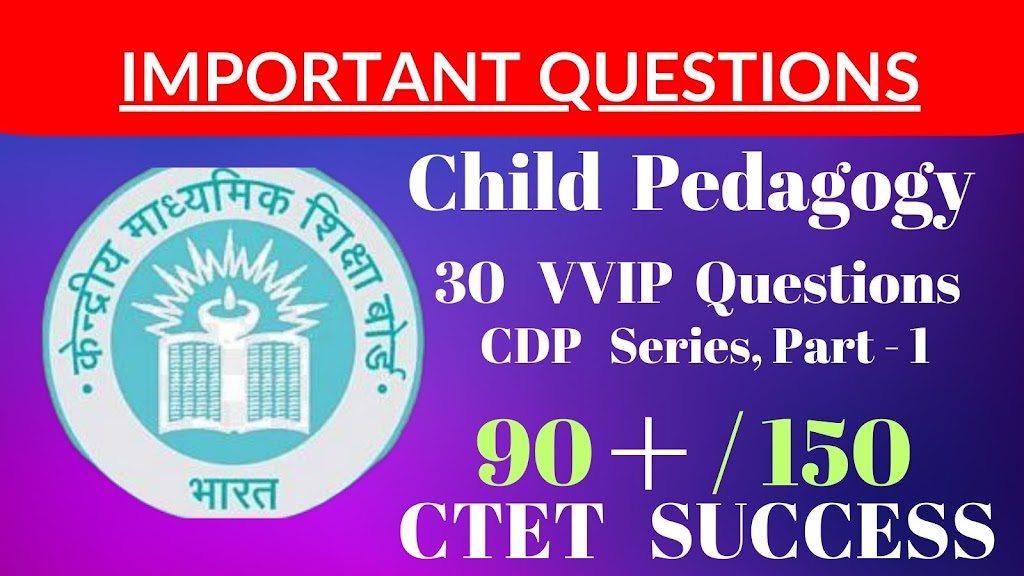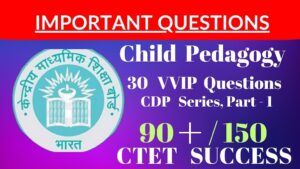“Significant Queries for CTET: Unveiling the Core Pedagogical Landscape. Aspiring teachers, gear up for success in the Central Teacher Eligibility Test (CTET) by exploring pivotal questions that delve into the essence of effective teaching methodologies. This concise guide navigates through essential aspects of educational theory, child development, and classroom management. By addressing these key inquiries, candidates can enhance their understanding of pedagogical principles, ensuring a solid foundation for success in the CTET exam. Unlock your teaching potential by grappling with these crucial questions, strategically designed to sharpen your knowledge and skills in the pursuit of becoming an exemplary educator.”
Certainly, here are 30 multiple-choice questions (MCQs) on Child Development and Pedagogy (CDP) along with their answers:
1. What is the primary focus of child development?
a) Cognitive development
b) Emotional development
c) Physical development
d) All of the above
2. According to Piaget’s theory, at what stage does a child develop object permanence?
a) Sensorimotor
b) Preoperational
c) Concrete operational
d) Formal operational
3. Who proposed the Social Learning Theory?
a) Jean Piaget
b) Erik Erikson
c) Albert Bandura
d) Lev Vygotsky
4. What does the acronym IQ stand for in the context of intelligence testing?
a) Intelligence Quotient
b) Intellectual Quality
c) Intelligent Questioning
d) Intellectual Quota
5. In Vygotsky’s Zone of Proximal Development (ZPD), what does the ‘proximal’ refer to?
a) Near
b) Far
c) Average
d) Difficult
6. Kohlberg is best known for his theory of:
a) Moral development
b) Cognitive development
c) Emotional development
d) Social development
7. Which of the following is NOT a stage in Erikson’s psychosocial development theory?
a) Trust vs. Mistrust
b) Identity vs. Role Confusion
c) Initiative vs. Guilt
d) Isolation vs. Independence
8. What is the term for learning by associating a conditioned stimulus with an unconditioned stimulus?
a) Operant conditioning
b) Classical conditioning
c) Observational learning
d) Social learning
9. Who proposed the stages of cognitive development in children, including the stages of sensorimotor and preoperational?
a) B.F. Skinner
b) Jean Piaget
c) Erik Erikson
d) Lev Vygotsky
10. Which learning style emphasizes hands-on experiences and experimentation?
a) Auditory
b) Visual
c) Kinesthetic
d) Analytical
11. According to Maslow’s Hierarchy of Needs, what is the highest level of need?
a) Physiological
b) Safety
c) Love and belongingness
d) Self-actualization
12. What is the main focus of the nativist theory of language development?
a) Social interaction
b) Biological factors
c) Environmental influences
d) Cultural context
13. Which theorist is associated with the concept of scaffolding in learning?
a) Jean Piaget
b) Erik Erikson
c) Albert Bandura
d) Lev Vygotsky
14. What is the key concept in Howard Gardner’s theory of multiple intelligences?
a) IQ
b) Emotional intelligence
c) Spatial intelligence
d) Learning styles
15. According to B.F. Skinner, learning is a result of:
a) Punishments
b) Reinforcements
c) Observational learning
d) Social interactions
16. What is the term for adjusting existing schemas to incorporate new information?
a) Accommodation
b) Assimilation
c) Adaptation
d) Attachment
17. Who proposed the theory of psychosocial development, emphasizing the importance of social relationships throughout life?
a) Jean Piaget
b) Erik Erikson
c) Sigmund Freud
d) Abraham Maslow
18. Which of the following is a characteristic of authoritative parenting style?
a) High demand, low responsiveness
b) Low demand, low responsiveness
c) High demand, high responsiveness
d) Low demand, high responsiveness
19. What is the main focus of behaviorism in the context of learning?
a) Internal cognitive processes
b) Environmental stimuli and responses
c) Emotional intelligence
d) Cultural influences
20. What is the term for the mental frameworks that shape and are shaped by our experiences?
a) Schemas
b) Assimilation
c) Accommodation
d) Adaptation
21. According to Bandura’s Social Learning Theory, what plays a crucial role in learning?
a) Punishment
b) Reinforcement
c) Observation and imitation
d) Schemas
22. In the context of Piaget’s stages of cognitive development, what characterizes the formal operational stage?
a) Logical reasoning and abstract thinking
b) Object permanence
c) Concrete operational skills
d) Sensorimotor coordination
23. According to Kohlberg’s theory, at what level do individuals consider the social contract and individual rights?
a) Preconventional
b) Conventional
c) Postconventional
d) Preoperational
24. What does the term “cognitive dissonance” refer to in the context of cognitive development?
a) Inconsistency between attitudes and behavior
b) Inconsistency between two cognitive schemas
c) Inconsistency in moral reasoning
d) Inconsistency in emotional intelligence
25. According to Vygotsky, what is the role of language in cognitive development?
a) It is a result of cognitive development
b) It is irrelevant to cognitive development
c) It precedes cognitive development
d) It plays a crucial role in cognitive development
26. Which theorist is associated with the concept of the “eight stages of psychosocial development”?
a) Jean Piaget
b) Erik Erikson
c) B.F. Skinner
d) Lev Vygotsky
27. According to Piaget, what is the term for the understanding that objects continue to exist even when they cannot be seen or touched?
a) Conservation
b) Object permanence
c) Centration
d) Reversibility
28. What is the primary focus of the ecological systems theory proposed by Urie Bronfenbrenner?
a) Cognitive development
b) Emotional development
c) Environmental influences on development
d) Social learning
29. Which of the following is a key component of emotional intelligence?
a) Logical reasoning
b) Spatial intelligence
c) Self-awareness and empathy
d) Concrete operational skills
30. According to Erikson’s theory, what is the primary developmental challenge during the stage of “Initiative vs. Guilt”?
a) Trust
b) Autonomy
c) Initiative
d) Industry


